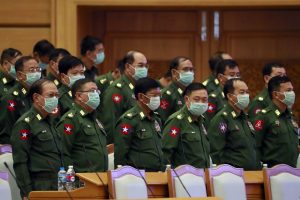The Tatmadaw (Myanmar’s armed forces) has postponed the long-awaited and long-planned celebration of the 75th anniversary of its founding – its “diamond jubilee” — due to the COVID-19 outbreak. The decision to postpone the celebration and military parade was swift and strategic, announced a week before the World Health Organization declared the disease a global pandemic.
Since early March, the Tatmadaw had prepared for the outbreak by reallocating resources for military hospitals and now mobilizing combat medics to Chin state for quarantine. All of these crisis response measures are a political statement. Army officers even took the bold step of wearing surgical masks during parliamentary sessions debating the constitutional amendments proposed by the National League for Democracy. The message from Myanmar’s military was loud and clear: The Tatmadaw is a single united entity, which is always prepared for a crisis. With its triumph over the attempted constitutional amendments, which sought to limit the role of the military in politics, the Tatmadaw is now focusing on other fronts, such as institution building and the peace process.
Beyond its COVID-19 response, military operations in Rakhine state and Northern Shan state are still on track. With the declaration of Arakan Army as a terrorist organization on March 23, the Tatmadaw kept up the momentum of its operations in Rakhine state. A ceasefire there is not in the foreseeable future. Meanwhile, in cooperation with international agencies, anti-narcotic operations were conducted in Northern Shan state and disabled most of the major drugs producers in the region. These production facilities were intertwined with the local people’s militia.
The Tatmadaw cut ties with its former local allies and departed from decades worth of people’s war doctrine in favor of standardized forces with conventional capabilities: the Standard Army reform.
The 75th anniversary television miniseries, with its own historical interpretation, clearly articulated the military’s way of thinking to the public.
Keeping its old slogans, the vision for the 75th anniversary recited the old three main causes and six principles for peace. Thus it is clear that the Tatmadaw’s position on the peace process and negotiations remains unchanged.
Along with the COVID-19 outbreak, a planned peace conference may delay and impact the ongoing peace process, which remains oriented toward a nationwide ceasefire agreement. Without convening national dialogues and Union Peace Conferences, negotiations on security sector development through the peace process will be challenging.
However, that does not mean that Tatmadaw will pause in institution building; rather it will keep up its own agenda on the Standard Army reform.
Indeed, upgrading the Tatmadaw’s arsenal is at the top of Standard Army reform list. Myanmar’s first Kilo-class submarine is expected to be commissioned in the upcoming months, along with other domestically developed equipment. Still one puzzle piece is missing: the new defense white paper, the public policy document to address the Tatmadaw’s strategic projection in the region and security challenges.
Undeniably, when it comes to both domestic politics and strategic position, the Tatmadaw is keeping its old spot as the “Savior of the Nation” — with a new twist amid the COVID-19 pandemic.
Amara Thiha is the Senior Research Manager at Myanmar Institute for Peace and Security (MIPS) and a nonresident fellow at the Stimson Center. The views and opinions expressed here do not necessarily reflect the policies or positions of MIPS and Stimson Center.

































